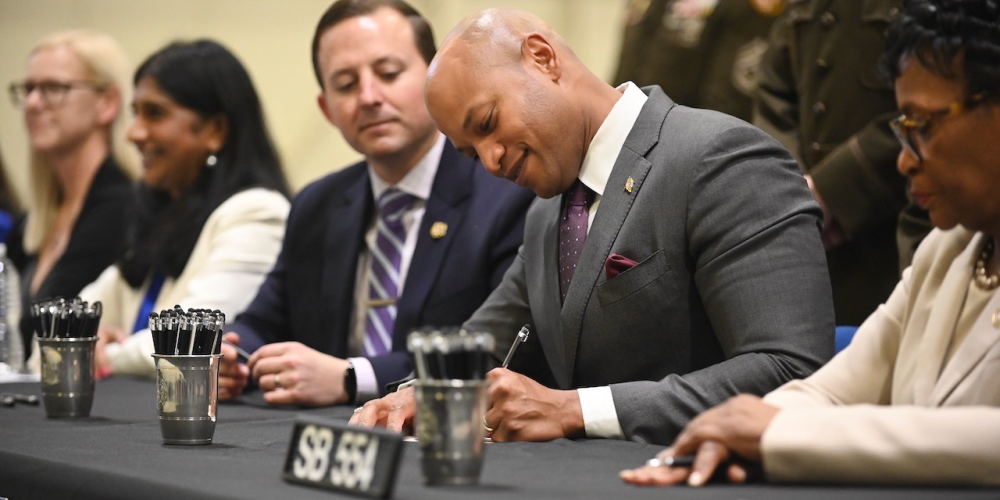MOAA National serves in an advisory capacity for state-specific issues such as income tax exemption. Please contact your local MOAA council as state legislation must originate at the state level; get updates from four states on legislative moves below.
California: Bill Passes Key Committee
The only state still fully taxing military retirement pay moved closer to reversing that policy June 14 when a bill exempting retired pay from all uniformed services, as well as Survivor Benefit Plan payments, unanimously cleared the state Senate’s Governance and Finance Committee.
The Military Services Retirement and Surviving Spouse Benefit Payment Act would last 10 years, beginning Jan. 1, 2024.
[UPDATED JUNE 2023: MOAA’s Military State Report Card and Tax Guide]
Originally introduced by Assemblymember James Ramos, the bill now boasts more than two dozen members who’ve co-introduced or co-authored the legislation. It also has a perfect voting score, passing the Assembly Revenue and Taxation Committee 11-0 on May 1 and the Appropriations Committee 15-0 (with one member absent) May 18 before clearing the full Assembly 77-0 (three members absent) May 22.
The bill moved to the Senate this month, passing the Governance and Finance Committee 7-0. That committee has referred it to the Senate Military and Veteran Affairs Committee which will consider it on July 10.
MOAA’s California Council of Chapters (CALMOAA) has been a longtime supporter of the legislation, dating back to previous Assembly sessions.
The success this year is due in large part to a unified and strong showing from veterans organizations, said Lt. Cmdr. Jeff Breiten, USN (Ret), vice president of legislative affairs for MOAA’s California Council of Chapters.
“That’s been what I feel has propelled the bill this year,” Breiten said, expressing optimism about their chances in the Senate.
[RELATED: Find a MOAA Chapter Near You | Find a Virtual Chapter]
The path so far hasn’t been without suspense – the bill passed its final committee hurdle the day before the session deadline for legislation to clear committees and be eligible for consideration on the floor. Unlike legislation in many states, it would specifically extend the retired-pay exemption to retired members of the Coast Guard and of the commissioned corps of the U.S. Public Health Service (USPHS) and NOAA.
“Our wild card is the governor, who has remained silent and made no public comments whether he opposes or supports,” Breiten said.

Maryland Gov. Wes Moore signed a series of military-related legislation in Middle River, Md., home of the Maryland Air National Guard’s 175th Wing, on May 12, including a limited exemption to uniformed services retired pay. (Photo via Maryland.gov)
Maryland: Governor Signs Limited Exemption
Representatives from MOAA’s Maryland Council of Chapters took part in a May 12 signing ceremony as Gov. Wes Moore enacted a new law increasing the state’s tax exemption for uniformed services retired pay.
The Maryland Senate passed the Keep Our Heroes Home Act 46-0 in April, a month after the bill cleared the state House. It will increase annual exemptions for retired pay to $12,500 for those under age 55 (up from $5,000) and to $20,000 for those 55 and over (up from $15,000). The act applies to the 2023 tax year and beyond, and it includes Coast Guard, USPHS and NOAA retiree pay, similar to the proposed California legislation.
The Maryland Military Coalition, which includes the Maryland MOAA council, will continue to fight for further increases to the exemption amount; Moore’s initial proposal called for $25,000 in exemptions in 2023, increasing to $40,000 in exemptions in 2024, regardless of a retiree’s age.
[RELATED: MOAA’s Digital Retirement Guide]
The increased exemptions represent a “small win” and a “positive step,” said Col. David Dragics, USA (Ret), legislative director for the coalition and legislative liaison for MOAA’s Fort Meade Chapter.
“This is a start, but we want to hold the governor and the legislature to this. We believe that Maryland can do better,” he said.
The coalition hopes to prepare more data that will demonstrate the economic impact of enticing military retirees to stay or move to Maryland. The next legislative session kicks off in January.
Montana: Limited Exemption Becomes Law
A law exempting up to 50% of military retired pay and survivor benefits from state income tax will take effect in 2024.
Gov. Greg Gianforte signed SB 104 on May 19, less than a month after it cleared the state legislature. The bill does not cover USPHS or NOAA retirees, but would include retired members of the Coast Guard.
[RELATED: Financial Calculators From MOAA]
Montana does not offer any military-specific exclusions at present, but does allow a partial exemption for all types of retirement income for taxpayers under certain income thresholds.
The bill does include some residency requirements and restrictions. Click here to read the legislation.
Colorado: Exemption Extended
An exemption from state income tax for military retired pay for retirees under 55 has been extended for another five years.
The measure, which exempts the first $15,000 in retirement pay, cleared the state Senate just hours before the Colorado General Assembly closed its session, said Col. Shelly Kalkowski, USAF (Ret), legislative chair for MOAA’s Colorado Council of Chapters. Gov. Jared Polis signed the bill June 5.
Protecting the exemption was the top priority for the United Veterans Coalition (UVC) of Colorado, an advocacy group which counts MOAA’s Colorado Council among its members.
[MORE ON COL. KALKOWSKI: MOAA’s 2020 Strobridge Award Recipient Gives Credit to Fellow Advocates]
“We’re very proud and honored. It was entirely bipartisan,” said Kalkowski who also serves as state legislative vice chair for the UVC. “It’s important that all military retirees and people who are considering military retirement in Colorado know that there is some recognition for their service, particularly when so many other states already exempt 100%.”
Servicemembers 55 and over in Colorado are eligible for a partial tax exemption available for all types of retirement income. More information on service-connected taxation in Colorado is available at this link.
PREMIUM Membership Comes With So Many Benefits. Are You Taking Full Advantage?
Find out just how many benefits are waiting for you, and start using them TODAY.

